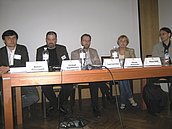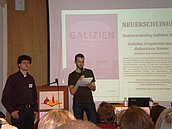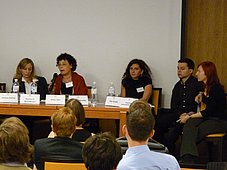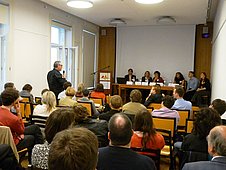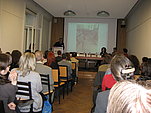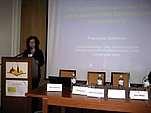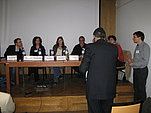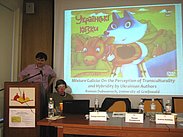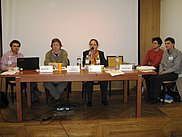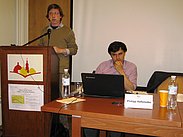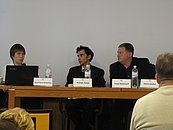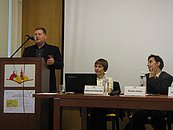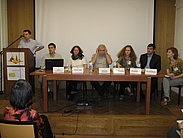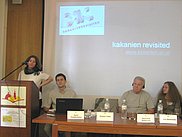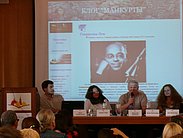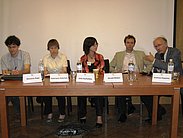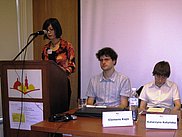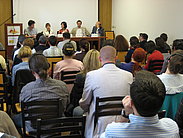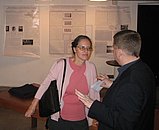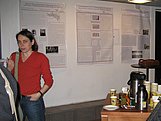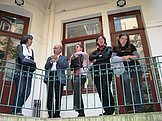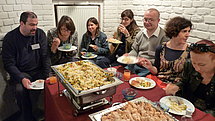Conference: Galicia in the 20th Century. A Region in the Shadow of Empires
3-5 June 2010
Center for Urban History of East Central Europe in Lviv
Programm [Englisch] | [Deutsch] | [Ukrainian]
Konferenzbericht (pdf)
Round table discussion I: Galicia. Discursive Constructions
Chair: Roman Dubasevych
The conference started with one of three panel discussions, which is dedicated to the semantic crossroads of various Galicia-discourses. Various national (state) codes of these perceptional contexts form the main topic of the discussion, as well as questions concerning the role of power and rule in these discourses. Furthermore, the problem of a one-sided, purely emphatic projection of multiculturalism is debated.
Panel discussion with: Danuta Sosnowska (Warsaw)| Christoph Augustynowicz (Vienna)| Tarik Cyril Amar (Lviv)| Klaus Hödl (Graz)
Panel I: Violence, War and Gender
Chair: Angelique Leszczawski-Schwerk | Ihor Kosyk
In the first half of the 20th century Galicia became a place for a large range of violence- and war-experiences. They started with World War I and continued through the Polish-Ukrainian War on former Galicia in 1918-1919 and culminated in the atrocities of World War II. These conflicts caused profound changes in this area; they had tremendous effects on its population as well as on the political and social situation. Consequently these outcomes of violence had a strong impact on people’s memory and literature – for instance, as victims of the military operations or as representatives of the resistance movement in the underground. These experiences have been examined in particular through the perspective of gender (gender studies).
Jan Surman (Minnesota) |
“Rus' does not dance": Student Protests of 1907 in Lviv
Joanna Dufrat (Wrocław) |
Gender in combat: Polish women in fight in Lviv and East Galicia (1918 - 1919)
Martin M. Weinberger (Vienna) |
Der Erste Weltkrieg als Konfrontation der Geschlechter. Krieg und Gender in der österreichischen Literatur über Galizien (The First World War as Gender-confrontation. War and Gender in the Austrian Literature about Galicia)
Dalia Ofer (Jerusalem) |
Jewish Women in Resistance or Resistance of Women: revisiting concepts and events
Olena Petrenko (Bochum)|
Verehrt und verachtet: Zur Problematik biographischer Rekonstruktion von Frauenschicksalen in der UPA (Idolised and despised: The problem of biographical reconstruction of female fates in the UPA)
Panel II: Pogroms and Expulsions
Chair: Klemens Kaps | Ihor Datsenko
During the Nazi-occupation various pogroms took place in Galicia, which faced a strong participation among the local population. This topic, controversially debated in East Central Europe over the last years, serves as starting-point for discussing the relationship between external oppression and internal collaboration and/or participation in genocide and expulsions. Hence, this panel examines differences and parallels of pogroms and discusses the issue of continuity. Hereby the context of state rule as well as social and intercultural relation-ships are highlighted. The chronological frame reaches from the end of the 19th century to World War II. This panel should allow the elaboration of explanatory tools as well as the limits of comparative analysis.
Tim Buchen (Berlin) |
The pogrom in Western Galicia in 1898
Jerzy Mazur (Binghamton) |
The anti-Jewish pogroms in Western Little Poland in November 1918 – The Case of Brzesko
Eva Reder (Vienna) |
Comparing the pogroms of Lviv 1918/19 and Cracow 1945
John Paul Himka (Edmonton) |
The Pogrom in Lviv in 1941
Francisca Solomon (Vienna) |
Die Deportation der Juden aus der Bukowina (The deportation of the Jews from Bucovina)
Panel III: The Long Shadow of Empires – Galicia postcolonial?
Chair: Klemens Kaps
Imperial rule decisively influenced the interethnic relationship in this multicultural region and was Galicia’s main feature in the 19th and the 20th centuries. As imperial and national borderland Galicia was an object of various “civilizing-” or “appropriation-” projects. During this panel the interrelation between imperial and national appropriations of Galicia have been discussed as well as the convenience and limits of postcolonial studies’ terminology.
Roman Dubasevych (Greifswald) |
Mixture Galicia: Threat or failed chance? On the perception of hybridity in the works of Ukrainian authors
Andrea Komlosy (Vienna) |
Österreichische Interessen an der Wiederentdeckung Galiziens nach 1989 (Austrian interests in rediscovering Galicia)
Philipp Hofeneder (Vienna) |
Karl Marx zwischen Galizien und der Sowjetunion. Die Sprachenpolitik der Ukraine in den 1920er Jahren. (Karl Marx between Galicia and the Soviet Union. The language policy of Ukraine in the 20s of the 20th Century)
Panel IV: Cultural Memory
Chair: Simon Hadler | Roman Dubasevych
The main topic of this panel will be the Renaissance of Galicia over the last years and decades as an academic research topic, in memory discourses and marketing strategies. The historical narrative’s turn towards culture, politics and tourism evokes the question of how to deal with Galicia’s past. It also stimulated debates about different ways of memory and ethics – including literature, art, design of the public space and memory politics.
Katarzyna Kotyńska (Warsaw) |
Австрійський Львів у польській прозі ХХ ст.: втрачений рай? (Austrian Lemberg in the Polish prose of the 20th Century – a lost paradise?)
Roman Holyk (Lviv) |
Country of Towns, Country of Villages? Stereotypes about Galicia in Ukrainian and Polish Mentality in the 19th and 20th Century
Vasyl Rasevyč (Lviv) |
Visualising Galicia: Constructs, interpretations, instrumentalisations
Round table discussion II: Galicia as a virtual space
Chair: Ihor Kosyk | Angelique Leszczawski-Schwerk
Based on the approaches of Panel IV this round table serves for a discussion on Galicia in the internet. The main issues will be the following: What new discourses can we find in new media such as internet-forums and -newsletters? In what way does the internet contribute to the creation of a transnational discursive space? What influences does such a virtual discursive space have on the shaping of historical narratives? The round table discussion is connected with the presentation of several scholarly and cultural web-sites.
Introductory presentation: Sara Froschauer (Vienna) |
The Presentation of Central Europe in internet platforms
Presentations: Oleksandr Khokhulin (Blog Mankurty, Lviv) | Ihor Balyns’kyj (zaxid.net, Lviv) | Katalin Teller (Kakanien revisited, Vienna) | Sofia Dyak, Serhii Tereshchenko (Center for Urban History of East Central Europe, Lviv)
Discussion of the websites and blogs with Żanna Słoniowska (Kraków)
Round Table discussion III: Quo vadis, Galicia? Research paradigms on the crossroads
Chair: Andreas Kappeler
Let us draw some conclusion after two decades of a Galicia-hype in academic research. During this closing round-table we want to present the results of the conference as well as to discuss the future potential of Galicia-studies, their national, transnational and interdisciplinary paradigms.
Impulse: Julia Sushytska (Redlands)|
Eastern Europe: The Self that is also its Other
Discussion with: Katarzyna Kotyńska (Warsaw)| Harald Binder (Vienna/Lviv)| Julia Sushytska (Redlands)| Klemens Kaps (Vienna)
Campus der Universität Wien
Spitalgasse 2, Hof 1.11
A-1090 Wien

